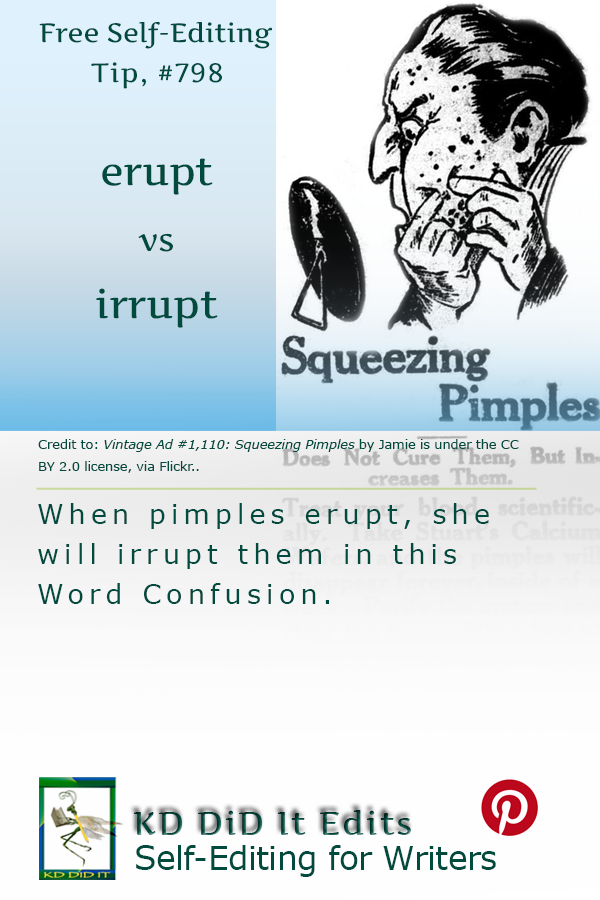A friend sent a request to blow up the difference between erupt and irrupt.
I know! Who knew there was such a word as irrupt?
A quick synopsis is that erupt is to break out whereas to irrupt is to break in.
Word Confusions…
…started as my way of dealing with a professional frustration with properly spelled words that were out of context in manuscripts I was editing as well as books I was reviewing. It evolved into a sharing of information with y’all. I’m hoping you’ll share with us words that have been a bête noir for you from either end.
If you found this post on “Erupt versus Irrupt” interesting, consider tweeting it to your friends. Subscribe to KD Did It, if you’d like to track this post for future updates.
| Erupt | Irrupt |
|---|---|
| Credit to: Apple Dictionary.com; Dictionary.com: erupt, irrupt | |

A gouache of Mount Vesuvius in Eruption at Night, 1794, is under the CC BY 4.0 license, via Wikimedia Commons is courtesy of Wellcome Images and was uploaded by Fæ. — Sure glad I wasn’t there when it erupted! |

Body Surfing is under the CC0 license, via pxhere. — The crowd irrupted at the concert. |
| Part of Grammar: | |
| Verb, intransitive & transitive
Third person present verb: erupts |
Verb, intransitive
Third person present verb: irrupts |
| Verb, intransitive: [Of a volcano] Become active and eject lava, ash, and gases
Verb, transitive:
[Of a volcano, geyser, etc.] To eject (matter) |
Enter forcibly or suddenly
To break or burst in suddenly To manifest violent activity or emotion, as a group of persons |
| Examples: | |
| Verb, intransitive: Mount Pinatubo began erupting in June. Hot lava erupted from the crust. Fierce fighting erupted between the army and guerrillas. Cheers erupted from the crowd. The soldiers erupted in fits of laughter. Just before her big date, a gigantic pimple erupted on her chin. Hives erupted all over his face and hands. At birth, people usually have 20 baby teeth, which start to erupt at about six months of age. Verb, transitive: She erupted angry words. Mount Vesuvius violently erupted molten rock, pulverized pumice, and hot ash at 1.5 million tons per second. |
Absurdities continually irrupt into the narrative.
The boys irrupted into the kitchen. Our dinner party was irrupted. The snowy owls irrupted southward. The debate irrupted. The population of India is irrupting. |
| Derivatives: | |
| Adjective: eruptible, eruptive, unerupted Noun: eruption Verb, intransitive: preerupt, reerupt |
Adjective: irruptive, unirrupted Adverb: irruptively Noun: irruption |
| History of the Word: | |
| Mid-17th century, from the Latin ēruptus meaning broken out, burst forth, from the (past participle of ērumpere), from e- (a variant of ex-) meaning out + rumpere (past participle) meaning burst out, break, rupture. | 1850–55 as irruption from the Latin irrupt- meaning broken into, from the verb irrumpere, which is from in- (into) + rumpere (break). |
C’mon, get it out of your system, bitch, whine, moan…which words are your pet peeves? Also, please note that I try to be as accurate as I can, but mistakes happen or I miss something. Email me if you find errors, so I can fix them…and we’ll all benefit!
Satisfy your curiosity about other Word Confusions by exploring the index. You may also want to explore Formatting Tips, Grammar Explanations, and/or the Properly Punctuated.
Resources for Erupt versus Irrupt
“Irrupt vs Erupt.” Grammarist. n.d. Accessed 18 August 2019. <https://grammarist.com/usage/erupt-vs-irrupt/>.
Pinterest Photo Credits:
Vintage Ad #1,110: Squeezing Pimples by Jamie is under the CC BY 2.0 license, via Flickr.



Several times, I have heard people say that they were ‘disgruntled’ (meaning unhappy or annoyed).
So I started to wonder if there was such a thing as ‘gruntled.’
I looked it up…and yes there is. But I have never heard happy or contented people say that they are gruntled. The word just doesn’t sound happy, does it?
Guess that is why the word ‘gruntled’ is relatively unknown and basically unused.
LOL, I have to agree with you, Mary, *more laughter* I’m certainly not planning…oh, wait…maybe I should just for a laugh!
Mary, may I have your permission to use your name for a post on “Disgruntled versus Gruntled”?